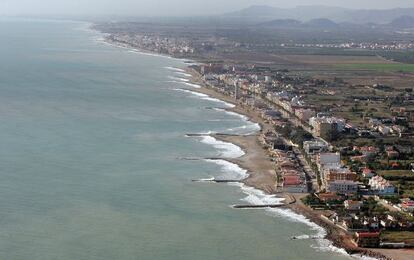PP government paves way for Coast Law amnesty on Spanish shorelines
Beachside property owners must show they are hooked up to public services


The Popular Party (PP) government is planning to open a little loophole in Spain's strict coastline protection laws. A planned amendment to the 1988 Coast Law reduces ¡ª in practice ¡ª the protected shoreline area from the current 100 meters to just 20 meters.
But homes that are now located within this 80-meter strip will be subject to very strict controls if property owners want to make structural changes, assuming they get the approval from and comply with the rules of their municipal governments.
To remove their beachside homes from the present state of legal limbo, owners must demonstrate that they have an access road, water supplies, sewage disposal and electrical power.
Environment Ministry officials said that changes to the law are being proposed at the request of the regional governments in Galicia and the Canary Islands. The modification is also aimed at resolving the situation of existing population areas that fall under the 1988 law, which back then did not meet the qualifications to be considered urban areas, but do meet the requirements proposed in the amendment.
"This means that inside the 80-meter area, there will be no ban on building stemming from the Coast Law," explained a ministry source, who added, however, that no new buildings can be built simply on the basis of the proposed reform.
This is nothing but a loophole because it legalizes all the breaches to the law¡±
Those municipalities that want to take advantage of the new standard will have a three-month period after the amendment is passed to solicit authorization with the entire process expected to end in two years. If officials at the Environment Ministry do not raise any objections to the applications within 18 months, then it would be understood that the petition is favorable and the local governments can go ahead and introduce the regulations in their areas.
"This is nothing but a loophole because it legalizes all the breaches to the current law," said Fernando Palao, a former secretary of state under the previous Socialist government and one of the architects of the Coast Law of 1988. Palao says that the only kind of illegal building that will not be covered by the changes are single, isolated homes. "The problem is how to enforce all of this," he said.
Jos¨¦ Ortega, a lawyer and president of the People Affected by the Coastal Act Platform, believes that a big problem will occur when it comes time to appraise all the land in these areas. "It \[the amendment\] doesn't define what the boundaries should be of the areas to be appraised," he said.
The PP's proposal is just one of 184 amendments in a major government reform package, which will be debated in the Senate this month.
In the neighborhood of Ojos de Garza in Telde, Gran Canaria, people are confident that the changes will at least buy them some time. There are 21 demolition orders for this ward and 30 other homes could also face similar razing orders if they are determined to remain squatter settlements on public land.
"The amendment does not address the homes that risk demolition. If they existed before 1988, then they are out of the public domain and they are considered to have owners," the Environment Ministry official said.
During a debate in the Canary Islands regional parliament, PP Senator Mar¨ªa Rosa de Haro explained that the amendment will give some flexibility to the authorities when administering those zones that can demonstrate they are connected to municipal services.
Tu suscripci¨®n se est¨¢ usando en otro dispositivo
?Quieres a?adir otro usuario a tu suscripci¨®n?
Si contin¨²as leyendo en este dispositivo, no se podr¨¢ leer en el otro.
FlechaTu suscripci¨®n se est¨¢ usando en otro dispositivo y solo puedes acceder a EL PA?S desde un dispositivo a la vez.
Si quieres compartir tu cuenta, cambia tu suscripci¨®n a la modalidad Premium, as¨ª podr¨¢s a?adir otro usuario. Cada uno acceder¨¢ con su propia cuenta de email, lo que os permitir¨¢ personalizar vuestra experiencia en EL PA?S.
?Tienes una suscripci¨®n de empresa? Accede aqu¨ª para contratar m¨¢s cuentas.
En el caso de no saber qui¨¦n est¨¢ usando tu cuenta, te recomendamos cambiar tu contrase?a aqu¨ª.
Si decides continuar compartiendo tu cuenta, este mensaje se mostrar¨¢ en tu dispositivo y en el de la otra persona que est¨¢ usando tu cuenta de forma indefinida, afectando a tu experiencia de lectura. Puedes consultar aqu¨ª los t¨¦rminos y condiciones de la suscripci¨®n digital.








































